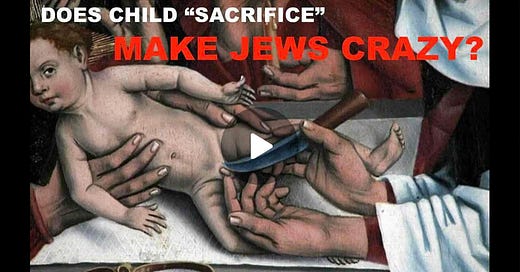Historian Laurent Guyénot, author of From Yahweh to Zion, returns to discuss his two most recent articles, “The Disraeli Enigma” and “The Cursed Nation and the Temple of Satan.”
On a related note, see my argument with Jonas Alexis, who negatively reviewed From Yahweh to Zion in the new issue of Culture Wars.
Excerpts from the transcript:
Laurent Guyenot: I'm not fighting against Christianity and I'm definitely not fighting against Jesus. I feel Jesus is an incredibly inspiring heroic figure. “Jesus is a Palestinian.” We need Jesus. I'm not trying to deny the importance of Jesus as a central figure in our civilization.
But my priority now became to understand Israel. And I became convinced that you cannot understand modern Israel if you don't understand that modern Israel is the same as ancient Israel. And that's a big disagreement with Christians (who say) “modern Israel has nothing to do with the people of ancient Israel, who were holy people. Yes, they wanted to genocide the Amalekites, but that's because the Amalekites were really, really, really bad.”
I'm fed up with these kinds of things. I feel Netanyahu wants to genocide the Amalekites exactly as Moses wanted to genocide the Amalekites. And I feel it's really way too late now to start to defend ancient Israel. Ancient Israel is just as demonic as modern Israel. And if you don't come to the point of realizing this, you just cannot understand what Israel is. You think “it's because they're Zionists, they're not real Jews in any way, they're Ashkenazi Jews.” And you find all kinds of excuses to protect the essence of Israel.
The essence of Israel is in the Bible, is in the Torah. I don't especially want to burn the Torah, but I want to put it in a museum or in a library together with Homer and this kind of thing. It's an interesting book, but I definitely don't want anything to do with it as the story of God choosing the Jews. I don't believe God chose the Jews. If I talk to Christians, I want to help them to find a way to get out of this dilemma.
And one way, I suggest to them is (to ask): Did Jesus really claim to be the Messiah? Because it doesn't really matter. You say, well, there's the true Messiah or the military Messiah. In any case, if Jesus said, yes, I am the Messiah, that means he stands within the paradigm of the chosen people. Because if God sends the Messiah, that means He needs the holy people and so on. From the historical perspective, that of historians of Jesus, it's debatable. because there is this, notion of the messianic secret. Sometimes Jesus sounded like he said, yes, I'm the Messiah, but don't say it, don't tell it to anyone—which of course, from the historian's point of view, means that he didn't say “I'm the Messiah.” It's the disciples who said he was the Messiah after he died. It's very simple ogic that leads us to conclude that, in fact, Jesus rejected the title of Messiah.
So we can say we can basically become Marcionist. That's why I offer to the Christian the only way you can get out and start to save Christianity. Because if you continue to worship ancient Israel, you are worshipping the Devil. If you think Yahweh is God, you are confusing God with the Devil. So the only way you can get out of this catastrophic situation is to understand that Jesus is not the Messiah. Jesus is a guy who is like Socrates, a guy who is completely 100% loyal to the truth, to what he saw as true, to the point of sacrificing his life.
In a few days, we will have the anniversary of the self-immolation of Aaron Bushnell. I was thinking about this today. I felt I have to write something.
Jesus was like that. He could not stand to see this evil society. He spoke out or — he's not like Aaron Bushnell, but the impulse to be totally, 100%, in harmony with what you believe, you know, and going all the way: That's what Jesus was. So he was destroyed. He is precisely the saint, the patron saint, of people like you and me. Or at least we should try to imitate him in the sense of fighting against Israel to the point of being ready to pay the price.
Jesus, by the way, was crucified not by the Jews, but by the empire. They use the empire to destroy their enemy.
So I get carried away. But what I wanted to say fundamentally is that I feel it's wrong to defend ancient Israel. It's wrong to excuse Moses for having to kill the Amalekites. Now, everybody can see what is Israel. So you have no excuse any more. And we hear Netanyahu say “the Gaza people are Amalek.” We have no more excuses for the Torah. We have to go to the root of the problem. The root of the problem is the Torah.
Kevin Barrett: There is an alternative between orthodox Christianity, which embraces the so-called Old Testament or Torah as an inerrant holy book—at least traditional Christians do that—and the Marcionite position, which is basically your position, which is that the God of the Old Testament is the Devil.
And that third position alternative is the one that I, of course, adhere to. It is based on the Islamic interpretation that, number one, the Torah or Old Testament has been distorted by the human transmitters, namely the Jewish cognitive elite. They turned a series of the divine revelations that had been given to try to guide this deeply misguided tribe back to the straight path, but they kept rebelling. They're the most stiff-necked, obdurate, basically evil, let's face it, satanic group of people ever.
For Muslims the record of the Jewish people that comes down in the Torah and then is totally revised by the Quran gives us the image of a people who are not good people. No Muslim would ever defend the ancient nation of Israel, far from it. We see the ancient nation of Israel as a deeply troubled and misguided nation that got prophetic revelations attempting to bring it back to truth and justice. But instead of accepting the message of truth and justice, that is, the message of God, who is truth, al-Haqq, the Jewish cognitive elite took their metaphysical chops—and maybe not just a kind of a logical, rational understanding, but a kind of mystical ability. And they turned it to black magic, to evil. In other words, they were getting the message that should have guided them back to the straight path. And they kept rebelling against it satanically. And then when they wrote down their book, they changed the message. And so, yes, indeed, you do have plenty of demonic influence coming through that book.
So that third position then would still see Jesus as a divine prophet, and maybe in a sense, the Messiah prophet, the one who totally clarifies what's been at stake through the entire Torah, which is the truth of God, God's truth, coming through prophets, and being expressed to a deeply evil people to try to give them one more chance to straighten up. And the only sense in which they're privileged or chosen is that they've been given so many chances, but all it does is give them more chances to damn themselves.
So that's the Quranic view and that's my view.
Well, that's not my view, Kevin, as you know, but I understand and I’m willing to dialogue. But basically, my view now is that this whole prophetic tradition is bogus. And all eschatology…I feel eschatology is meaningless. I don't understand Hegel very well, but I feel like I'm a Hegelian. I feel there is meaning in history, but it has nothing to do with the Abrahamic tradition. I believe in God very strongly, but I try more and more to separate myself from the tradition considering God as a person who chooses some people or other, or who speaks, gives orders, gives laws and these kind of things. At my age, I have to follow my spiritual intuition, and it tells me to run away as far as possible from that and try to re-understand the Greco-Roman cosmic God of the Stoics, the understanding that God is everything. God is...God is not a person outside that you can relate to, person to person, and you can pray to him (as a person).
That's the Islamic view too, though. The Islamic view is identical with that. It (the Islamic view) is like with the Godhead in Christianity as opposed to the personal God. That's another thing Islam corrects: Misguided anthropomorphism of God as some human male patriarch. That's not the view in Islam. Ar-Rahman ar-Rahim, the first two tangible characteristics of God in Islam, come from a root that has to do with the womb. And rahmah, mother love, is the root. So if anything, if you had to pick male or female, you would go with female because absolute love is mother love.
But the Quran consistently explains that ultimately God is far beyond any human characteristics. SubhanAllah, Allahu Akbar—these kinds of well-known formulas—that's what they're expressing. And so once again, the problem in this (Middle Eastern monotheistic) tradition that you identify so well was solved 1400 years ago.
Let's talk a little bit about your take on circumcision. Your article takes on the Cainite/Kenite hypothesis, the notion that Jews have considered themselves chosen precisely because deep inside they feel themselves cursed. So chosenness is a reaction formation to feeling cursed. Why do they feel cursed? (Their ancestor) Cain killed Abel. So to make up for this, they start doing child sacrifices: the eighth day child sacrifice of the firstborn male. And then at some point they substitute circumcision for the eighth day sacrifice. And this leaves a trauma on Jewish children.
They grow up with this horrible unconscious baggage, this PTSD. When they were just tiny infants, their bond with their mother was badly damaged when this evil stranger took them and tortured them by cutting at their most sensitive part of their anatomy. And so they grow up with this memory, a buried unconscious memory. And then they're brainwashed into their tribe by the rabbis who say: “There's this evil stranger out there, the goy, the non-Jew, who wants to do unspeakable things to you, put you in gas chambers and drive you into the sea and throw you in the well and so on.”
That resonates with the Jewish kid, because he has a buried memory of the evil stranger who did this horrible thing to him. The irony is that it was the damn rabbi who's brainwashing him who actually did it.
And you don't want to go into the bathhouse with that rabbi either, I'm telling you.
(Laughing)Yeah, exactly. Well, you know, I wrote a theory, which is a theory. There's no hard evidence. But it's an interesting theory. And I do believe there is some truth to the idea that they feel chosen, but deeper than that, they feel cursed.
And I like to quote Leo Pinsker, a forerunner of Theodore Herzl. He was a proto Zionist who around 1860 wrote Auto Emancipation, a short book calling for the return to Palestine. He wrote once, “the Jews are the people chosen by universal hatred.” Meaning that “the whole world hates us. That's our destiny. Eternally, it will be like this. That's why we have to go to Palestine and live among ourselves.”
That was his main argument, basically: “We are cursed. We are the cursed people. We are chosen by universal hatred.”
So I feel there is this duality in Jewishness. They feel chosen, but basically they feel chosen because they feel hated by the whole of human kind. And it's kind of vicious circle. And therefore, the question arises, why does humankind hate us? “They're jealous because we're chosen and they are not chosen.” This kind of duality is a constant.
There is also the German author Theodore Lessing. He wrote Self-Hatred and claimed that all Jews hate themselves deep inside to some degree. There is a universal aspect of Jewishness is self-hatred. That was his point. So hat's an interesting idea which connects maybe to depth psychology’s trying to understand the psychopath. He's a person who hates himself profoundly. He wants to hide himself because he knows he's evil. He knows he has no heart. So he has to lie constantly because deep inside he feels cursed. He feels he has no soul. So he wants to destroy the souls of others because he feels himself deprived of a soul. At least that's one angle to try to make sense of it.
And then it connects to a historical possibility that we're dealing with a tribe that gets fossilized into a prehistoric mentality—a tribe who felt cursed because their ancestor killed his brother. Or more probably their ancestors killed the whole tribe. Because in the Bible, Cain means the Kenites. Every name represents their descendants, the people that (trace their ancestry to that figure).
So the story of Cain and Abel probably was a way to tell the story of two related tribes. And one of them killed the other, which means exterminated them. That's a possibility really, because one of the incredible things about Jews is the sense that they are the same today as they were 3000 years ago. So it's really a fossil civilization that spiritually never moved. Maybe something happened 3000 years ago that created some kind of trauma or some kind of sense of cursedness or some kind of collective trauma that made them completely fossilized. And then the fossilization was probably reinforced by the Bible itself. In the Bible, you have stories of prehistoric warfare. A tribe genociding another tribe. That Bronze Age ethic.
The idea of Cain and Abel representing these two tribes and then the ancestor of the Jews, the Cain tribe or the Cainites, exterminating the other tribe, has interesting resonances with the genocide we see going on today. And it does remind me that Cain was an agriculturalist, and Abel a shepherd. And so the agriculturalist, Cain, didn't have his sacrifice accepted. I guess it wasn't a bloody enough sacrifice or something. And so that's why he was jealous. And slew his brother. But that notion of one tribe of agriculturalists versus another tribe of pastoralists and then warfare between the tribes and then an extermination is an interesting one to think about, as we're living through this tribal genocide playing out before our eyes in Palestine.
Yeah. And then the other point you mentioned is circumcision. It's true. I feel it's very important to study about this subject because eighth-day circumcision. And some people tell me: “Muslims also circumcize.” But we're talking about eight-day circumcision. We're talking about a newborn babe. I feel it's completely different when you have circumcised boys at the age of…I don't know. In Morocco, what's the standard age for being circumcised?
Around eight years rather than eight days?
Eight years, okay. It's completely different. It raises questions or problems, but they're of a different order because eight-day boy has a capacity to symbolize, to try to make sense. The whole context is different. In my view, it's a little bit like an initiation ritual. Maybe that's not the Islamic way to look at it, but it has something to do with being initiated into the world of adults. But in the case of newborn babes, it's completely different. I'm not a medical doctor. I read a little bit and I do feel it makes sense to think that it has a very profound effect. Mothers testify that it breaks the mother bond. It does have a deep effect on an unconscious level, even on the mother. We talk sometimes of the Jewish mother, the strange relationship between Jewish mothers and their sons, right? There's something not completely…there's some problem in that relationship. And it's connected to circumcision, I believe, because when you read testimonies of mothers who struggled when hearing their son scream when being circumcised, you understand there's also some deep guilt within the mother. I'm not qualified to (analyze it comprehensively) but I feel, anyway, legally, from the legal point of view, it must be banned. And there is a strong argument that when it is banned, the Jewish question will be solved. It's really a big part of the problem. I think lawyers should… I hope some people are fighting on that legal level to get it banned. It's completely unacceptable from a legal standpoint to mutilate young babies. It's completely unacceptable. And the reason why it cannot be banned is that because Jewish rabbis know that if Jews stop circumcising their sons, they will stop being Jews, basically, very quickly. They will stop being part of the tribe.
It's an incredibly strong…it's in the genitals, it's on your physical body, it's a deep mark in your soul. So I think that's an interesting point that maybe is not discussed enough.
I think there have been a few countries in Europe that tried to ban circumcision.
Iceland tried, I think, in 2014. The small nation of Iceland wanted to pass a law. I think the law passed to forbid it. And then, of course, the whole Jewish...they found a way to make threats to the country, to the people, and they overturned the law.
At least the Icelanders tried.
And maybe you should quickly go over the reason why eighth-day circumcision is probably vastly more damaging psychologically than eighth-year circumcision would be among Muslims. And then there are other initiation ritual circumcisions that are parallel to Muslims’ among other groups. It's a fairly common thing in sub-Saharan Africa, actually, going back for as long as it's been recorded.
Your article cited a researcher whose name I don’t remember. But the one I know about is Bowlby, B-O-W-L-B-Y. And Bowlby is considered the founder of attachment theory in psychology. And there's a whole school of thought around this where they experimented on monkeys as well as observing human children. And what they discovered... was that when children have a disturbed relationship with their caretaker, usually their mother during the first year of life, they have very profound psychological damage that follows them and is basically ineradicable for the rest of their lives.
The attachment or this bond—a secure attachment, they call it—between the infant and the mother during the very earliest stages of life is absolutely crucial for future development. And so it's pretty obvious that circumcision radically disrupts this mother-child bond and creates what they call insecure attachment, which leads to a long list of very, very negative outcomes throughout life for people who've had that disruption in their past.
Maybe not for everybody, but at least for a strong percentage. Because, you know, we all have trouble. Many of us had troubled childhoods. Many of us had not very good mothers and so on. So many of us are a bit disturbed. But when it's done systematically over a population…I think it creates a trauma, unconscious issues that people are going to have to deal with if they had that happen to them.
As some of the U.S. American non-Jews, including myself, did have that happen. I was circumcised when I was a baby. And I think at that time it was done to maybe 80 or 90 percent of the population. And now it's down to maybe 50 percent. But in any case, the point is that the science of psychology would argue that this kind of trauma at that very early age is really, really bad—much, much worse than at a later age. And often the Jewish apologists...say, “oh, if something happens to a baby, they don't remember it because we can't remember what happened to us when we were eight days old. Therefore, they're going to just forget it. They're not really human yet.” They come up with all this kind of stuff. Again, the psychology has shown that that's not true. You need to read Bowlby for the full story.
Yeah, the attachment theory. I mean, it's just common sense, you know.
Don't torture babies. That's common sense. Unfortunately, that's what they've been doing in Gaza. They're going after the mothers and the babies. And maybe their hatred of mothers and babies has something to do with circumcision. But we're at the end of the show, so we can't speculate further. We're just going to have to say thank you, Dr. Laurent Guyenot. Always good talking with you.













Share this post